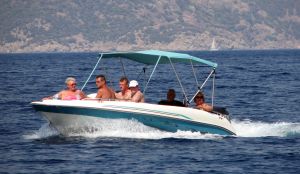 “Thirty-year-old convicted murderer, Thaddeus Jimenez, was released from prison after serving only sixteen years on a fifty-year prison sentence.” When people here something like this, they can’t believe it. Why are we letting violent criminals out of prison? The answer: he is innocent. That being said, let’s rephrase the headline: “Wrongfully convicted man is exonerated after serving sixteen years in prison for a murder that he did not commit.” Mr. Jimenez was arrested for the murder at age 13 and spent the last 16 years trying to prove his innocence.
“Thirty-year-old convicted murderer, Thaddeus Jimenez, was released from prison after serving only sixteen years on a fifty-year prison sentence.” When people here something like this, they can’t believe it. Why are we letting violent criminals out of prison? The answer: he is innocent. That being said, let’s rephrase the headline: “Wrongfully convicted man is exonerated after serving sixteen years in prison for a murder that he did not commit.” Mr. Jimenez was arrested for the murder at age 13 and spent the last 16 years trying to prove his innocence.
Florida Bomb Threat at a St. Augustine High School
 In St. John’s County, Florida, students attending St. Augustine High School had to evacuate their school due to a bomb threat. The students were sent to Sebastian Middle School. Later, the middle school also received a bomb threat, and all students were evacuated. While bomb threats at a local school may seem like a childish hoax, it is a serious criminal offense in Florida. According to Florida Statute Section 790.163 and 790.164, a person that makes a bomb threat will be charged with a second-degree felony. Second-degree felonies are punishable by up to 15 years in the Florida State Prison. Also, these Florida bomb threat statutes specifically state that a judge may not withhold adjudication of guilt. Therefore, this charge will result in a criminal conviction that can follow a person for the rest of his life.
In St. John’s County, Florida, students attending St. Augustine High School had to evacuate their school due to a bomb threat. The students were sent to Sebastian Middle School. Later, the middle school also received a bomb threat, and all students were evacuated. While bomb threats at a local school may seem like a childish hoax, it is a serious criminal offense in Florida. According to Florida Statute Section 790.163 and 790.164, a person that makes a bomb threat will be charged with a second-degree felony. Second-degree felonies are punishable by up to 15 years in the Florida State Prison. Also, these Florida bomb threat statutes specifically state that a judge may not withhold adjudication of guilt. Therefore, this charge will result in a criminal conviction that can follow a person for the rest of his life.
Jacksonville Possession of a Firearm by a Convicted Felon: What About Antique Firearms?
 Can a convicted felon possess an antique firearm in Jacksonville, Florida? It appears that the Florida Supreme Court has not directly answered this question. According to Florida Statute Section 790.23, a convicted felon is prohibited from possessing a firearm. This crime is known as Jacksonville Possession of a Firearm by a Convicted Felon. Florida Statute Section 790.001(6) defines “firearm” and specifically exempts antique firearms, unless it is used in the commission of a crime. From the plain language of these Florida laws, it would seem obvious that a Jacksonville convicted felon may possess an antique firearm since it is not prohibited by the statute. However, Florida case law does not support this rationale.
Can a convicted felon possess an antique firearm in Jacksonville, Florida? It appears that the Florida Supreme Court has not directly answered this question. According to Florida Statute Section 790.23, a convicted felon is prohibited from possessing a firearm. This crime is known as Jacksonville Possession of a Firearm by a Convicted Felon. Florida Statute Section 790.001(6) defines “firearm” and specifically exempts antique firearms, unless it is used in the commission of a crime. From the plain language of these Florida laws, it would seem obvious that a Jacksonville convicted felon may possess an antique firearm since it is not prohibited by the statute. However, Florida case law does not support this rationale.
U.S. Supreme Court Limits Vehicle Searches
In the recent United States Supreme Court decision, Arizona v. Gant, the Court limited a police officer’s ability to search a criminal defendant’s vehicle. Prior to this ruling, there was a debate as to whether police officers may search the passenger compartment of a vehicle when an occupant of the vehicle is arrested. This is known as a search incident to arrest, which allows police officers to search a vehicle without a warrant. In Gant, the Supreme Court ruled that law enforcement may conduct a search of a vehicle incident to arrest only in two situations:
- At the time of the search, the defendant is within reaching distance of the interior of the vehicle, or
- the officers have a reasonable belief that the vehicle contains evidence of the offense for which the defendant is being arrested.
Jacksonville Constructive Possession of a Controlled Substance in a Jointly-Occupied Vehicle
As a Jacksonville Criminal Defense Lawyer, I have handled numerous possession of a controlled substances cases. Arrests for possession of a controlled substance, such as marijuana or cocaine, occur every day in Jacksonville, Florida. A person can be in actual or constructive possession of cocaine. Actual possession occurs when the drug is physically “on” or extremely close to the person. Constructive possession occurs when the drug is in a location where the person concealed it or has control over it.
- knowledge of the presence of the controlled substance and
- the ability to exercise dominion and control over it.
Jacksonville constructive possession is difficult to do if the defendant is in a car occupied by more than one person. In fact, in a recent Florida case, Brown v. State, 34 Fla. L. Weekly D773a (Fla. 4th DCA 2009), ruled that the State of Florida did not prove that the driver of a vehicle was in constructive possession of Xanax which was located in the center console of the vehicle. The driver and a passenger were in the vehicle, and either one of them could have been in possession of this drug. The court ruled this way, because the prosecutor failed to present sufficient, independent evidence that the defendant knew about the presence of the Xanax and had the ability to control it.
Alcohol Found on Boat Involved in Jacksonville Area Crash
 The Florida Fish and Wildlife Commission (FWC) have been investigating the boat crash that occurred on the Intracoastal Waterway in Palm Valley between Jacksonville and St. Augustine, Florida. The FWC discovered alcoholic beverages in the boat and are investigating whether the driver of the boat was under the influence of alcohol. In the Jacksonville area, it is not illegal to have open containers of alcoholic beverages in a vessel. However, it is illegal to drive a vessel if you are impaired by alcohol. This is known as boating under the influence (BUI). Thus far, no one involved in Sunday’s Intercoastal boating accident has been charged with BUI, but the FWC is still looking into it. Even if the FWC can show that the driver did consume alcohol, this is not enough to charge a person with BUI. It is not illegal to have a drink or two and drive a boat. However, it is illegal too drink too much, or be drunk, and operate a boat.
The Florida Fish and Wildlife Commission (FWC) have been investigating the boat crash that occurred on the Intracoastal Waterway in Palm Valley between Jacksonville and St. Augustine, Florida. The FWC discovered alcoholic beverages in the boat and are investigating whether the driver of the boat was under the influence of alcohol. In the Jacksonville area, it is not illegal to have open containers of alcoholic beverages in a vessel. However, it is illegal to drive a vessel if you are impaired by alcohol. This is known as boating under the influence (BUI). Thus far, no one involved in Sunday’s Intercoastal boating accident has been charged with BUI, but the FWC is still looking into it. Even if the FWC can show that the driver did consume alcohol, this is not enough to charge a person with BUI. It is not illegal to have a drink or two and drive a boat. However, it is illegal too drink too much, or be drunk, and operate a boat.
Florida Boating Accident Claims Five Lives
 On Sunday, a 22-foot boat crashed into a tug that was docked in Palm Valley, Florida. The boat was traveling from St. Augustine to Jacksonville, Florida. Five people were killed and several others were injured. Witnesses claim that the boat was traveling at a high rate of speed. Moreover, the Florida Fish and Wildlife Conservation Commission is investigating the circumstances surrounding the crash, including boating under the influence.
On Sunday, a 22-foot boat crashed into a tug that was docked in Palm Valley, Florida. The boat was traveling from St. Augustine to Jacksonville, Florida. Five people were killed and several others were injured. Witnesses claim that the boat was traveling at a high rate of speed. Moreover, the Florida Fish and Wildlife Conservation Commission is investigating the circumstances surrounding the crash, including boating under the influence.
- under the influence of alcohol or a chemical substance to the extent that the person’s normal faculties are impaired or
- the person has a blood or breath alcohol level of 0.08 or higher.
The penalties for Jacksonville Boating Under the Influence are similar to Jacksonville DUI penalties with some minor differences. The most significant difference is that a Jacksonville Boating Under the Influence conviction will not result in a Florida driver’s license suspension. However, it will suspend your boating privileges.
Jacksonville Hardship Licenses for Driver’s with Prior DUI Convictions
When a Jacksonville driver receives a Driving Under the Influence (DUI) conviction, his driver’s license is suspended. The more prior Jacksonville DUI charges that a driver has, the longer the suspension. However, most people are eligible for a Florida hardship license, even if they have prior Jacksonville DUI convictions.
- been convicted of DUI two times or
- had his license suspended for refusal two or more times.
This Florida law does not make an exception for Florida drivers with a refusal suspension. However, Florida Statute Section 322.271(2)(b) allows a Jacksonville driver that has been previously convicted of DUI to petition for a hardship license, but there is a waiting period. A Jacksonville DUI that resulted in a five year license suspension has a 12 month waiting period, and a Jacksonville DUI with a ten year license suspension has a 24 month waiting period. After the waiting period has expired, a Jacksonville DUI lawyer can petition the department of motor vehicles and establish the basis for granting a hardship license.
Get a Florida Hardship Driver’s License after a Jacksonville DUI
 After a Jacksonville DUI arrest, normally, the driver receives a 10 day temporary driving permit. During this time period, his Jacksonville DUI Attorney should request a DMV hearing which will occur within 30 days of such request. During this 30 day period, the Jacksonville DMV will issue a temporary driving permit. After the hearing, the DMV will either reverse the Jacksonville DUI suspension or uphold it. If the DMV upholds the Florida driver’s license suspension, you may be eligible for a hardship license.
After a Jacksonville DUI arrest, normally, the driver receives a 10 day temporary driving permit. During this time period, his Jacksonville DUI Attorney should request a DMV hearing which will occur within 30 days of such request. During this 30 day period, the Jacksonville DMV will issue a temporary driving permit. After the hearing, the DMV will either reverse the Jacksonville DUI suspension or uphold it. If the DMV upholds the Florida driver’s license suspension, you may be eligible for a hardship license.
- Jacksonville DUI will a blood or breath alcohol level or .08 or higher: In this scenario, a driver must wait 30 days, after the suspension occurred, before he can obtain a hardship license. The clock does not begin to run until the Florida driver’s license is actually suspended, so you must wait until after the temporary driving permit expires.
- Jacksonville DUI where the driver refused the chemical test: In this scenario, the driver must wait 90 days, instead of the 30 days stated above.
Jacksonville Abuse of the Elderly Creates Civil and Criminal Liability
 As a Jacksonville Criminal Lawyer, I have represented criminal defendants charged with abusing and exploiting the elderly in accordance with Chapter 825 of the Florida Statutes. Since I began practicing with Law Office of David M. Goldman PLLC, I have also experienced the civil liability associated with Jacksonville Elder Abuse. Pursuant to Florida Statute Section 415.1111, the victim of elder abuse can recover actual and punitive damages from his or her abuser. Additionally, Florida Statute Section 772.11 allows an elderly person that has been exploited under Chapter 825 to obtain up to three times his actual damages.
As a Jacksonville Criminal Lawyer, I have represented criminal defendants charged with abusing and exploiting the elderly in accordance with Chapter 825 of the Florida Statutes. Since I began practicing with Law Office of David M. Goldman PLLC, I have also experienced the civil liability associated with Jacksonville Elder Abuse. Pursuant to Florida Statute Section 415.1111, the victim of elder abuse can recover actual and punitive damages from his or her abuser. Additionally, Florida Statute Section 772.11 allows an elderly person that has been exploited under Chapter 825 to obtain up to three times his actual damages.



